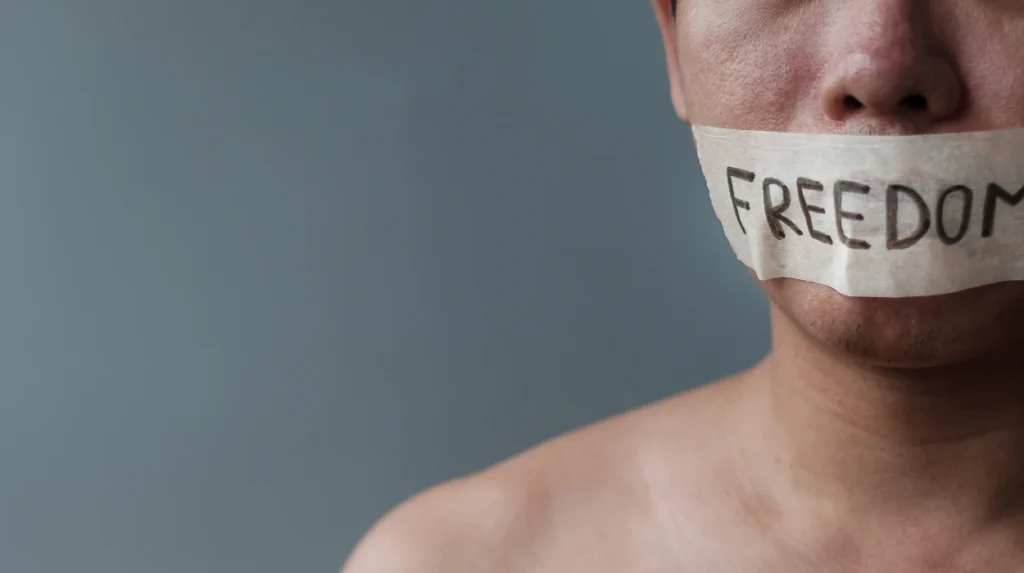There is a great need to address freedom of speech concerns regarding whether Saudi Arabia as a host country is suitable to host the football event. One crucial issue is that the country doesn’t have freedom of speech.
To host the FIFA World Cup 2034, the country needs to adhere to values of diversity and inclusivity besides human rights. To get the hosting rights of the World Cup it is important to confine to the right of free speech.
Fundamental of Human Rights: Freedom of Speech
This gives freedom to speak and criticize the government and ask for change without any fear of persecution. Freedom of speech has therefore maintained an environment free and open for media, journalists, and fans. In a world where Saudi Arabia has some of the most restricting environments for free speech, the opposite is true.
Since 2010, at least 20 prominent Saudi dissidents have been sentenced to long prison terms or travel bans for expressing dissenting views on religion, politics, and human rights nananananananananaananana
Reportage entities such as Reporters Without Borders and Human Rights Watch report that the “Saudi government controls what is sayable, what is written or broadcasted, and punishes anyone who speaks against it.” This directly goes against FIFA’s stated human rights policies in which they claim to support freedom of expression and the freedom of the press.
Saudi Arabia: Censorship and Media Control
When it comes to such a global event as the FIFA World Cup, there must be open access for media to freely cover it. Reporters from all parts of the world come and write about the event. There are match results, politics, and social issues connected to the tournament.
However, the notion of the free press is hardly alive in Saudi Arabia. The Saudi government also censors newspapers, television, and online content and limits critical reporting on sensitive topics. Saudi will even be stricter on speech. The journalists can expect even stiffer challenges ahead of 2034. Saudi Arabia scored 24 out of 100 in the “Freedom on the Net” ranking and thus falls in the “Not Free” category 17.
In 2022, 15 were arrested and sentenced to between 10 and 45 years in prison for their activities online. Salma al-Shehab, a PhD student, was imprisoned for 34 years for being an advocate of women’s rights activists on Twitter.
Impact on Fans and Visitors
A World Cup needs a climate that gives room to host the fans and entertain them without the constraints of government and social order. In Saudi Arabia, whatever one says regarding criticism of the government, monarchy, or religion goes straight to prison.
Press Freedom Ranking: Ranked 169 out of 180 countries for freedom of the press in 2018 by Reporters Without Borders and ranked 170 in the 2023 World Press Freedom Index.
Fans expressing political views – Many fans of football voice their political concerns through international events, whether that is corruption or discrimination or about the world situation. In Saudi Arabia, critical banners, chants, or critical social media postings could lead to arrest or even deportation.
LGBTQ Issues
Saudi Arabia does not recognize LGBTQ+ identity. A majority of fans and footballers who support LGBTQ+ will live in fear of visiting a country in which their identification is not even recognized or persecuted.
Social activities in social media are watched by the government of Saudi Arabia. Even tourism with comments relating to criticism about the place, even before a tourist reaches there, is exposed to risks.
The World Cup should be an event of togetherness and inclusiveness. However, strict Saudi Arabian laws are going to haunt the event with intimidation and self-censorship.
Reputation Damage to FIFA
Well, FIFA has always tried to portray itself as a champion of human rights and freedom of speech but granting the World Cup to Saudi Arabia is quite contrary to such claims. It received severe criticism for granting the 2022 World Cup to Qatar, with similar concerns of human rights and free speech raised in that case.
On the other hand, choosing Saudi Arabia would mean further blemishing its standing and credibility. It would most likely be protested by fans, players, and human rights organizations, as it was hypocrisy on how the human rights policies being given by FIFA go. The 2034 World Cup may become another public relations disaster for FIFA as was the Qatar 2022 project since criticism of human rights abuses dominated the whole event.
Surveillance and Loss of Privacy
Another significant issue that has been raised in the debate on whether Saudi Arabia is eligible to host the World Cup is its heavy surveillance of citizens and visitors. Saudi authorities have used the most advanced surveillance technology to monitor online activities, track down individuals, and suppress dissent.
There will be thousands of foreign visitors journalists and football fans at the World Cup. Even before entering the country, travelers could face targeting for their online activity. People who have criticized Saudi policies, women’s rights issues, or LGBTQ+ restrictions in the past may be denied entry or detained upon arrival.
This thus creates a hostile environment where one has to censor his or her speech and acts, which are entirely against the free and festive spirit of the World Cup.
Conclusion
Saudi Arabia has very limited freedom of speech. Therefore, the country cannot host the FIFA World Cup 2034. The country has a history of censorship and persecution of dissenters. Its control over media goes against the spirit of the tournament.
In Saudi Arabia, human rights, free speech, and freedom of the press are secondary to financial and political interests. Further erosion of credibility for FIFA is also a danger to players, journalists, and fans. The 2034 World Cup should celebrate football, not be a forum for censorship and repression.

